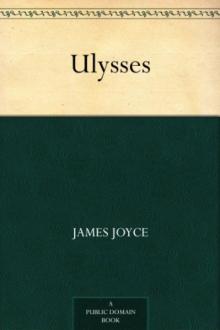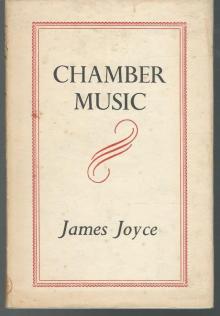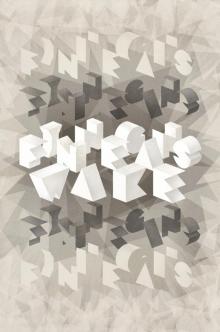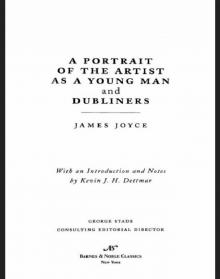- Home
- James Joyce
A Portrait of the Artist as a Young Man Page 12
A Portrait of the Artist as a Young Man Read online
Page 12
When the agony of shame had passed from him he tried to raise his soul from its abject powerlessness. God and the Blessed Virgin were too far from him: God was too great and stern and the Blessed Virgin too pure and holy. But he imagined that he stood near Emma in a wide land and, humbly and in tears, bent and kissed the elbow of her sleeve.
In the wide land under a tender lucid evening sky, a cloud drifting westward amid a pale green sea of heaven, they stood together, children that had erred. Their error had offended deeply God's majesty though it was the error of two children; but it had not offended her whose beauty is not like earthly beauty, dangerous to look upon, but like the morning star which. is its emblem, bright and musical. The eyes were not offended which she turned upon him nor reproachful. She placed their hands together, hand in hand, and said, speaking to their hearts:
— Take hands, Stephen and Emma. It is a beautiful evening now in heaven. You have erred but you are always my children. It is one heart that loves another heart. Take hands together, my dear children, and you will be happy together and your hearts will love each other.
The chapel was flooded by the dull scarlet light that filtered through the lowered blinds; and through the fissure between the last blind and the sash a shaft of wan light entered like a spear and touched the embossed brasses of the candlesticks upon the altar that gleamed like the battle-worn mail armour of angels.
Rain was falling on the chapel, on the garden, on the college. It would rain for ever, noiselessly. The water would rise inch by inch, covering the grass and shrubs, covering the trees and houses, covering the monuments and the mountain tops. All life would be choked off, noiselessly: birds, men, elephants, pigs, children: noiselessly floating corpses amid the litter of the wreckage of the world. Forty days and forty nights the rain would fall till the waters covered the face of the earth.
It might be. Why not?
— Hell has enlarged its soul and opened its mouth without any limits — words taken, my dear little brothers in Christ Jesus, from the book of Isaias, fifth chapter, fourteenth verse. In the name of the Father and of the Son and of the Holy Ghost. Amen.
The preacher took a chainless watch from a pocket within his soutane and, having considered its dial for a moment in silence, placed it silently before him on the table.
He began to speak in a quiet tone.
— Adam and Eve, my dear boys, were, as you know, our first parents, and you will remember that they were created by God in order that the seats in heaven left vacant by the fall of Lucifer and his rebellious angels might be filled again. Lucifer, we are told, was a son of the morning, a radiant and mighty angel; yet he fell: he fell and there fell with him a third part of the host of heaven: he fell and was hurled with his rebellious angels into hell. What his sin was we cannot say. Theologians consider that it was the sin of pride, the sinful thought conceived in an instant: non serviam: I will not serve. That instant was his ruin. He offended the majesty of God by the sinful thought of one instant and God cast him out of heaven into hell for ever.
— Adam and Eve were then created by God and placed in Eden, in the plain of Damascus, that lovely garden resplendent with sunlight and colour, teeming with luxuriant vegetation. The fruitful earth gave them her bounty: beasts and birds were their willing servants: they knew not the ills our flesh is heir to, disease and poverty and death: all that a great and generous God could do for them was done. But there was one condition imposed on them by God: obedience to His word. They were not to eat of the fruit of the forbidden tree.
— Alas, my dear little boys, they too fell. The devil, once a shining angel, a son of the morning, now a foul fiend came in the shape of a serpent, the subtlest of all the beasts of the field. He envied them. He, the fallen great one, could not bear to think that man, a being of clay, should possess the inheritance which he by his sin had forfeited for ever. He came to the woman, the weaker vessel, and poured the poison of his eloquence into her ear, promising her — O, the blasphemy of that promise! — that if she and Adam ate of the forbidden fruit they would become as gods, nay as God Himself. Eve yielded to the wiles of the archtempter. She ate the apple and gave it also to Adam who had not the moral courage to resist her. The poison tongue of Satan had done its work. They fell.
— And then the voice of God was heard in that garden, calling His creature man to account: and Michael, prince of the heavenly host, with a sword of flame in his hand, appeared before the guilty pair and drove them forth from Eden into the world, the world of sickness and striving, of cruelty and disappointment, of labour and hardship, to earn their bread in the sweat of their brow. But even then how merciful was God! He took pity on our poor degraded parents and promised that in the fullness of time He would send down from heaven One who would redeem them, make them once more children of God and heirs to the kingdom of heaven: and that One, that Redeemer of fallen man, was to be God's only begotten Son, the Second Person of the Most Blessed Trinity, the Eternal Word.
— He came. He was born of a virgin pure, Mary the virgin mother. He was born in a poor cowhouse in Judea and lived as a humble carpenter for thirty years until the hour of His mission had come. And then, filled with love for men, He went forth and called to men to hear the new gospel.
— Did they listen? Yes, they listened but would not hear. He was seized and bound like a common criminal, mocked at as a fool, set aside to give place to a public robber, scourged with five thousand lashes, crowned with a crown of thorns, hustled through the streets by the jewish rabble and the Roman soldiery, stripped of his garments and hanged upon a gibbet and His side was pierced with a lance and from the wounded body of our Lord water and blood issued continually.
— Yet even then, in that hour of supreme agony, Our Merciful Redeemer had pity for mankind. Yet even there, on the hill of Calvary, He founded the holy catholic church against which, it is promised, the gates of hell shall not prevail. He founded it upon the rock of ages, and endowed it with His grace, with sacraments and sacrifice, and promised that if men would obey the word of His church they would still enter into eternal life; but if, after all that had been done for them, they still persisted in their wickedness, there remained for them an eternity of torment: hell.
The preacher's voice sank. He paused, joined his palms for an instant, parted them. Then he resumed:
— Now let us try for a moment to realize, as far as we can, the nature of that abode of the damned which the justice of an offended God has called into existence for the eternal punishment of sinners. Hell is a strait and dark and foul-smelling prison, an abode of demons and lost souls, filled with fire and smoke. The straitness of this prison house is expressly designed by God to punish those who refused to be bound by His laws. In earthly prisons the poor captive has at least some liberty of movement, were it only within the four walls of his cell or in the gloomy yard of his prison. Not so in hell. There, by reason of the great number of the damned, the prisoners are heaped together in their awful prison, the walls of which are said to be four thousand miles thick: and the damned are so utterly bound and helpless that, as a blessed saint, saint Anselm, writes in his book on similitudes, they are not even able to remove from the eye a worm that gnaws it.
— They lie in exterior darkness. For, remember, the fire of hell gives forth no light. As, at the command of God, the fire of the Babylonian furnace lost its heat but not its light, so, at the command of God, the fire of hell, while retaining the intensity of its heat, burns eternally in darkness. It is a never ending storm of darkness, dark flames and dark smoke of burning brimstone, amid which the bodies are heaped one upon another without even a glimpse of air. Of all the plagues with which the land of the Pharaohs were smitten one plague alone, that of darkness, was called horrible. What name, then, shall we give to the darkness of hell which is to last not for three days alone but for all eternity?
— The horror of this strait and dark prison is increased by its awful stench. All the filth of the world, all the offal and scum of the
world, we are told, shall run there as to a vast reeking sewer when the terrible conflagration of the last day has purged the world. The brimstone, too, which burns there in such prodigious quantity fills all hell with its intolerable stench; and the bodies of the damned themselves exhale such a pestilential odour that, as saint Bonaventure says, one of them alone would suffice to infect the whole world. The very air of this world, that pure element, becomes foul and unbreathable when it has been long enclosed. Consider then what must be the foulness of the air of hell. Imagine some foul and putrid corpse that has lain rotting and decomposing in the grave, a jelly-like mass of liquid corruption. Imagine such a corpse a prey to flames, devoured by the fire of burning brimstone and giving off dense choking fumes of nauseous loathsome decomposition. And then imagine this sickening stench, multiplied a millionfold and a millionfold again from the millions upon millions of fetid carcasses massed together in the reeking darkness, a huge and rotting human fungus. Imagine all this, and you will have some idea of the horror of the stench of hell.
— But this stench is not, horrible though it is, the greatest physical torment to which the damned are subjected. The torment of fire is the greatest torment to which the tyrant has ever subjected his fellow creatures. Place your finger for a moment in the flame of a candle and you will feel the pain of fire. But our earthly fire was created by God for the benefit of man, to maintain in him the spark of life and to help him in the useful arts, whereas the fire of hell is of another quality and was created by God to torture and punish the unrepentant sinner. Our earthly fire also consumes more or less rapidly according as the object which it attacks is more or less combustible, so that human ingenuity has even succeeded in inventing chemical preparations to check or frustrate its action. But the sulphurous brimstone which burns in hell is a substance which is specially designed to burn for ever and for ever with unspeakable fury. Moreover, our earthly fire destroys at the same time as it burns, so that the more intense it is the shorter is its duration; but the fire of hell has this property, that it preserves that which it burns, and, though it rages with incredible intensity, it rages for ever.
— Our earthly fire again, no matter how fierce or widespread it may be, is always of a limited extent; but the lake of fire in hell is boundless, shoreless and bottomless. It is on record that the devil himself, when asked the question by a certain soldier, was obliged to confess that if a whole mountain were thrown into the burning ocean of hell it would be burned up In an instant like a piece of wax. And this terrible fire will not afflict the bodies of the damned only from without, but each lost soul will be a hell unto itself, the boundless fire raging in its very vitals. O, how terrible is the lot of those wretched beings! The blood seethes and boils in the veins, the brains are boiling in the skull, the heart in the breast glowing and bursting, the bowels a red-hot mass of burning pulp, the tender eyes flaming like molten balls.
— And yet what I have said as to the strength and quality and boundlessness of this fire is as nothing when compared to its intensity, an intensity which it has as being the instrument chosen by divine design for the punishment of soul and body alike. It is a fire which proceeds directly from the ire of God, working not of its own activity but as an instrument of Divine vengeance. As the waters of baptism cleanse the soul with the body, so do the fires of punishment torture the spirit with the flesh. Every sense of the flesh is tortured and every faculty of the soul therewith: the eyes with impenetrable utter darkness, the nose with noisome odours, the ears with yells and howls and execrations, the taste with foul matter, leprous corruption, nameless suffocating filth, the touch with redhot goads and spikes, with cruel tongues of flame. And through the several torments of the senses the immortal soul is tortured eternally in its very essence amid the leagues upon leagues of glowing fires kindled in the abyss by the offended majesty of the Omnipotent God and fanned into everlasting and ever-increasing fury by the breath of the anger of the God-head.
— Consider finally that the torment of this infernal prison is increased by the company of the damned themselves. Evil company on earth is so noxious that the plants, as if by instinct, withdraw from the company of whatsoever is deadly or hurtful to them. In hell all laws are overturned — there is no thought of family or country, of ties, of relationships. The damned howl and scream at one another, their torture and rage intensified by the presence of beings tortured and raging like themselves. All sense of humanity is forgotten. The yells of the suffering sinners fill the remotest corners of the vast abyss. The mouths of the damned are full of blasphemies against God and of hatred for their fellow sufferers and of curses against those souls which were their accomplices in sin. In olden times it was the custom to punish the parricide, the man who had raised his murderous hand against his father, by casting him into the depths of the sea in a sack in which were placed a cock, a monkey, and a serpent. The intention of those law-givers who framed such a law, which seems cruel in our times, was to punish the criminal by the company of hurtful and hateful beasts. But what is the fury of those dumb beasts compared with the fury of execration which bursts from the parched lips and aching throats of the damned in hell when they behold in their companions in misery those who aided and abetted them in sin, those whose words sowed the first seeds of evil thinking and evil living in their minds, those whose immodest suggestions led them on to sin, those whose eyes tempted and allured them from the path of virtue. They turn upon those accomplices and upbraid them and curse them. But they are helpless and hopeless: it is too late now for repentance.
— Last of all consider the frightful torment to those damned souls, tempters and tempted alike, of the company of the devils. These devils will afflict the damned in two ways, by their presence and by their reproaches. We can have no idea of how horrible these devils are. Saint Catherine of Siena once saw a devil and she has written that, rather than look again for one single instant on such a frightful monster, she would prefer to walk until the end of her life along a track of red coals. These devils, who were once beautiful angels, have become as hideous and ugly as they once were beautiful. They mock and jeer at the lost souls whom they dragged down to ruin. It is they, the foul demons, who are made in hell the voices of conscience. Why did you sin? Why did you lend an ear to the temptings of friends? Why did you turn aside from your pious practices and good works? Why did you not shun the occasions of sin? Why did you not leave that evil companion? Why did you not give up that lewd habit, that impure habit? Why did you not listen to the counsels of your confessor? Why did you not, even after you had fallen the first or the second or the third or the fourth or the hundredth time, repent of your evil ways and turn to God who only waited for your repentance to absolve you of your sins? Now the time for repentance has gone by. Time is, time was, but time shall be no more! Time was to sin in secrecy, to indulge in that sloth and pride, to covet the unlawful, to yield to the promptings of your lower nature, to live like the beasts of the field, nay worse than the beasts of the field, for they, at least, are but brutes and have no reason to guide them: time was, but time shall be no more. God spoke to you by so many voices, but you would not hear. You would not crush out that pride and anger in your heart, you would not restore those ill-gotten goods, you would not obey the precepts of your holy church nor attend to your religious duties, you would not abandon those wicked companions, you would not avoid those dangerous temptations. Such is the language of those fiendish tormentors, words of taunting and of reproach, of hatred and of disgust. Of disgust, yes! For even they, the very devils, when they sinned, sinned by such a sin as alone was compatible with such angelical natures, a rebellion of the intellect: and they, even they, the foul devils must turn away, revolted and disgusted, from the contemplation of those unspeakable sins by which degraded man outrages and defiles the temple of the Holy Ghost, defiles and pollutes himself.
— O, my dear little brothers in Christ, may it never be our lot to hear that language! May it never be our lot, I say! In the last day of ter
rible reckoning I pray fervently to God that not a single soul of those who are in this chapel today may be found among those miserable beings whom the Great Judge shall command to depart for ever from His sight, that not one of us may ever hear ringing in his ears the awful sentence of rejection: Depart from me, ye cursed, into everlasting fire which was prepared for the devil and his angels!
He came down the aisle of the chapel, his legs shaking and the scalp of his head trembling as though it had been touched by ghostly fingers. He passed up the staircase and into the corridor along the walls of which the overcoats and waterproofs hung like gibbeted malefactors, headless and dripping and shapeless. And at every step he feared that he had already died, that his soul had been wrenched forth of the sheath of his body, that he was plunging headlong through space.
He could not grip the floor with his feet and sat heavily at his desk, opening one of his books at random and poring over it. Every word for him. It was true. God was almighty. God could call him now, call him as he sat at his desk, before he had time to be conscious of the summons. God had called him. Yes? What? Yes? His flesh shrank together as it felt the approach of the ravenous tongues of flames, dried up as it felt about it the swirl of stifling air. He had died. Yes. He was judged. A wave of fire swept through his body: the first. Again a wave. His brain began to glow. Another. His brain was simmering and bubbling within the cracking tenement of the skull. Flames burst forth from his skull like a corolla, shrieking like voices:
— Hell! Hell! Hell! Hell! Hell!

 Penguin Classics the Restored Finnegans Wake
Penguin Classics the Restored Finnegans Wake A Portrait of the Artist as a Young Man (Dover Thrift Editions)
A Portrait of the Artist as a Young Man (Dover Thrift Editions) Ulysses
Ulysses Stephen Hero
Stephen Hero Dubliners
Dubliners A Very Irish Christmas
A Very Irish Christmas The Complete Works of JAMES JOYCE
The Complete Works of JAMES JOYCE Chamber Music
Chamber Music The Restored Finnegans Wake
The Restored Finnegans Wake A Portrait of the Artist as a Young Man
A Portrait of the Artist as a Young Man Portrait of the Artist as a Young Man and Dubliners (Barnes & Noble Classics Series)
Portrait of the Artist as a Young Man and Dubliners (Barnes & Noble Classics Series)